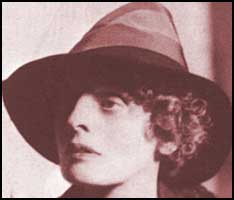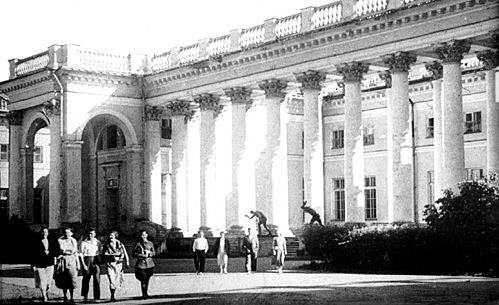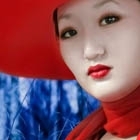Travel Guides - I Visit the Soviets
by E. M. Delafield
A Provincial Lady Looks at Russia
Harper and Brothers Publishers
New York and London 1917
pages 132-141
 The Palace is enormous, and a great deal of it is in baroque style, with much heavy gilt moulding and bright blue paint. Full and admirable descriptions of it are to be found in the guide-books, where I hope that justice is also done to those reception-rooms that are beautiful, and like the Arabian Nights. The walls of one are faced with amber, of another with mother-o'-pearl, of another with lapis-lazuli. There are chairs, covered in exquisite petit-point, against the walls - and lovely paintings - and Chinese panellings.
The Palace is enormous, and a great deal of it is in baroque style, with much heavy gilt moulding and bright blue paint. Full and admirable descriptions of it are to be found in the guide-books, where I hope that justice is also done to those reception-rooms that are beautiful, and like the Arabian Nights. The walls of one are faced with amber, of another with mother-o'-pearl, of another with lapis-lazuli. There are chairs, covered in exquisite petit-point, against the walls - and lovely paintings - and Chinese panellings.
If only there was no large parties of shuffling and muttering sightseers just ahead and just behind, how much more I should enjoy it all. I know it's not right, but that's how I feel.
The Swedish gentleman is roaring appreciatively, and asking intelligent questions as to where the amber came from, and how long it took to inlay the floor, and Mrs. Pansy Baker is shaking her head in disapproval of it all, and Miss Blake and Miss Bolton are talking in undertones, and I hear the word "vest" pass between them several times, and once Miss Bolton says that something - I can't catch what -"isn't like a gas-ring." I dare say not.

Above: Museum workers leaving the Alexander Palace, 1930's
We see the ballroom - or perhaps it's a banqueting-hall - and it has a special echo, and the guide goes into the middle of the room and addresses it in a ringing voice, so that it replies. And I captiously reflect how much better it must have sounded when it echoed to strains of music, instead of to the inanities of a young woman with a shrill voice and an uneducated intonation.
Naturally, I keep this thought to myself - and am, in fact, slightly ashamed of it and again, unwillingly, remember Margaret.
Then we are taken outside again.
The Alexander Palace is what I have really come to see, although I haven't said so. Amongst all the many books that I ought to have read, and haven't read, before coming to Russia, there are exceptions. I have read the story of the last days of the Romanovs.
We pass amongst some trees, and there is - comparatively speaking - quite a little palace. No larger than some of England's big countryhouses. Near the front of it is a narrow strip of garden and growing in a bed, violas - the first flowers, I think, that I have seen in Russia.
"Pansies - that's for remembrance.''
But I don't say this aloud, and nobody hears it.
Then we pass inside, and the guide becomes talkative and efficient, and Mrs. Pansy Baker ejaculatory.
The Swede is striding along and has grasped Miss Blake by the ann�I think quite impersonally�and is telling her something about the children of Sweden.
The Russian is stalking, solitary, behind Miss Bolton, and Miss Bolton is hunting madly inside her bag for something that won't be found.
For a second, the eyes of the Canadian meet mine, and I think I see in them the grave reflection of my own feelings.
"Now we are in the private rooms of the family. Here, they sat in the evenings. You will see in how very bad taste are the rooms. It was all in that style, what they had. All in very bad taste. Even the pictures they are bad."
Are they? There are a very great number of them, and there are quantities and quantities of signed photographs. All the relations of the Tsarina, German and English, and a painting of old Queen Victoria, and signed photographs. . . Memories of far-away countries and of days long gone by.
"There are many, many portraits of her - of the Tsarina - she was painted very often. She was very vain," says the guide complacently, in the tone of one who knows. She is, perhaps, somewhere in her middle twenties, and to her the Romanovs are not real people at all. They are only part of the glorious history of the Revolution. She has been told what to say about them, and she says it, and doubts not at all but that the whole of the truth is contained in her little glib parrot-phrases.
There are, as she says, many portraits of the Tsarina. In some of the early ones she looks almost gay - young and pretty, and very like a du Maurier drawing. Quite early, she must have grown grave and very serious, and always with a faint look of anxiety across these level dark brows. None of the later pictures are smiling ones, not even when she is portrayed with the four little dark-haired girls close beside her. And not when her small, frail only son lies in her arms.
One picture of her, in court robes, hangs in her husband's library high up on the wall. It shows the sad, obtuse, beautiful face under a diamond crown.
There are pictures of the Tsar too.
He is very like our own King George V.
"The Tsar's room, where he received his ministers. There is a secret staircase, leading to the room of the Tsarina, so that she could listen - "
And I look at the photographs, and close my ears.
There are books in the room too - a great many of them, in glass-fronted bookshelves. Most of them are beautifully bound - and then comes a row of Tauchnitz novels, all English. And a copy of Tartarin sur les Alpes, and I wonder if the Grand Duchesses read it in the schoolroom, and laughed.
"This was the bedroom of the Tsarina. You see, it was quite a little room, and so crowded, and all in such bad taste. And all the ikons�she was very superstitious, she would pray for hours . . ."
Yes, it is quite a little room. The bed and the dressing-table and the bergere still have their faded pink draperies. Religious emblems cover the walls - there are crucifixes, and ikons, and pictures of the Virgin and Child.
She prayed for hours.
There are photographs, and more photographs. All the children - the pretty, long-haired girls in plain white muslin frocks with high necks, and a photograph, on a little table all by itself, of the Tsar in naval uniform.
It is signed "Nicky."
"It has all been kept just as she left it. See, here are her things - "
The things are in a little glass-topped table. An ivory etui, and a small gold thimble, and some embroidery scissors. All kinds of odds and ends, and all rather worn and used. There are even one or two cheap toys - a china bird and a pincushion made like a shoe. The kind of things that one of the children might have given her.
"They are not even preet-ty," says the guide contemptuously.
She has no remotest conception that "prettiness" - by which she means in fashion - is a relative term, dependent on time and place, and that twenty-five years hence the standards of today will have given place to others, just as those of today have replaced those of twenty-five years ago.
She moves on into the adjoining room with her group and I can still hear her shrill, uninflected voice.
"The bedroom of the Tsar. The taste is very bad - the lamp-shade that terrible colour - "
And in the room of the Tsarina, where I linger, an elderly caretaker comes in by another door, on the far side of the rope that divides the room from the tourists.
She is going to dust all the things - what a lot of dusting they must need, there are so many of them! - but first, she looks at me and I look at her.
Neither of us speaks the other's language, and we exchange not a word. Only that look.
She picks up from the table by the bedside a photograph in a leather frame and carries it across to where I stand, and holds it out for me to see; and it is the Tsarevitch - a dark-haired, darkeyed, serious little boy in an English sailorsuit.
"We go now upstairs, to see the children's rooms. They are only on the next floor."
I tell the guide that I will wait downstairs. I don't wish to come up to the second floor.
"You are not interested?"
"I would rather sit down here and wait for you."
"No, please. You will come. The rooms are very inter-esting. They are just as they left them when they went away."
The guide, perhaps naturally, does not wish the members of her group to be separated. She becomes anxious, and rather insistent, till I say that I will sit on a bench in the garden and remain there without moving till they all come back again.
Then she reluctantly leaves me. Just as she is turning to go, a bright idea for my entertainment appears to strike her, and she turns back again.
"That window�you can see from where you are �it is through there that they went away. They were not allowed to go by the front door, the carriage it came to the side door. It was through there that they went away, on the last day, for their last drive."
"On their way to Ekaterinburg?"
"On their way to Ekaterinburg," she agrees cheerfully.
She lingers a moment longer to offer me a further inducement to accompany the group upstairs.
"I can show you even the toys of the children, that they left behind."
But I shake my head, and stay where I am, in view of the glass door through which the Romanovs were taken away, down the road that led in the end to the cellar of the House of Ipatievsky.
When the group is shepherded downstairs again, only Mrs. Pansy Baker and the Swedish pedagogue are still talking.
The others are silent.
"You didn't come upstairs?" says Miss Bolton, eyeing me rather curiously.
"No."
"They showed us everything. Even the toys that the Imperial children - "
"Yes, I know."
Miss Blake, in a low voice, says:
"There was a motor-car that had belonged to the little boy. It was his favourite toy."
And we all fall silent again.
"There is no more," says the guide merrily. "We have seen all."
Please send your comments on this page and the Time Machine to boba@pallasweb.com





 Imperial Bedroom
Imperial Bedroom Portrait Hall
Portrait Hall Mauve Room
Mauve Room Maple Room
Maple Room Aleksey's Bedroom
Aleksey's Bedroom Nicholas's Study
Nicholas's Study Aleksey's Playroom
Aleksey's Playroom Formal Reception
Formal Reception Balcony View
Balcony View Aleksey- Balcony
Aleksey- Balcony Children-Mauve
Children-Mauve Nicholas's Bathroom
Nicholas's Bathroom Alexandra- Mauve
Alexandra- Mauve Nicholas's Reception
Nicholas's Reception Tsarskoe Selo Map
Tsarskoe Selo Map